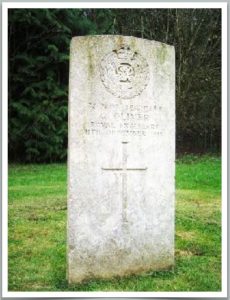Royal Engineers (Royal Monmouthshire)

George Oliver was born at Charlestown, Cornwall in 1891 and before joining the Army, he worked as a cooper.
He attested for the Royal Monmouthshire Royal Engineers (RMRE), at Monmouth, on 2 December 1914.
He first served overseas with No 5 Siege Company in the Mediterranean Expeditionary Force which landed in Egypt on 5 August 1915 and returned to England on 18 September 1915.
He next served with the British Expeditionary Force suffering a gun, or shrapnel, wound to the back on 28 September.
As a result, he received hospital treatment until the new year of 1917.
Thereafter he apparently served at the RMRE Depot at Monmouth. He was promoted to Acting Second Corporal on 24 March 1916, Acting Corporal on 18 July 1917, and Acting Serjeant on 2 March 1918.
At the time of his death on 11 December 1918 he was an explosives instructor.
He married Mabel Annie Yarworth (1890-1975), of Clearwell, at Monmouth Baptist Church on 24 July 1918.
On the morning of 11 December 1918 Lieutenant Reginald Victor Hayman was commanding a ‘booby trap’ course on what was described as the ‘Bombing Field’ at Monmouth, with Serjeant Oliver assisting.
Serjeant Oliver assembled the booby trap comprising a Mills bomb, fitted with an instantaneous fuse, and a tin of amatol explosive buried in a pit approximately one foot deep. A trip wire was laid from the grenade pin and attached to a shovel, which had been thrust into the ground a few feet from the device, as an anchor point for the trip wire.
To demonstrate the tripping of the booby trap, a further long length of wire was attached to the shovel and run out to a point considered to be a safe distance from the explosion. Serjeant Oliver pulled on the wire attached to the shovel which was intended, in turn, to pull the trip wire attached to the grenade pin and thus trigger the explosion.
The exact circumstances are unclear from the Board of Inquiry Record into the incident, but when Serjeant Oliver pulled on the firing wire from his safe point and the device did not explode he went forward and found that either the trip wire had broken or become detached from the shovel. Whilst making good whichever of these circumstances had caused the failure the device exploded, fatally wounding Serjeant Oliver in the head and face. The incident happened at 12 noon and he was taken to Monmouth Hospital where he died at 6.40pm.
Serjeant George Oliver, aged 27 years, of 4 Wyebridge Street, Monmouth, was buried at Clearwell Cemetery on 15 December 1918.
A standard CWGC headstone now marks his grave.
Researched by Eric Nicholls 4 October 2019
